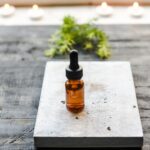Aromatherapy is a holistic healing practice that uses essential oils to promote physical, emotional, and mental well-being. Essential oils are highly concentrated plant extracts that capture the natural fragrance and therapeutic properties of plants. These oils can be inhaled, applied topically, or used in various other ways to harness their healing benefits.
The practice of aromatherapy is based on the belief that the inhalation or absorption of these essential oils can stimulate certain areas of the brain, triggering a physiological response in the body. When inhaled, the molecules of the essential oils travel through the olfactory system and interact with the limbic system, which is responsible for emotions, memory, and behavior. This interaction can have a profound effect on our physical and mental state.
The History of Aromatherapy: From Ancient Times to Modern Day
The use of aromatic plants for healing purposes dates back thousands of years. Ancient civilizations such as the Egyptians, Greeks, and Romans were known to use aromatic plants and their oils for medicinal and spiritual purposes. The Egyptians were particularly known for their extensive use of essential oils in embalming rituals and for their healing properties.
In more recent history, aromatherapy gained popularity in the early 20th century with the work of French chemist René-Maurice Gattefossé. Gattefossé accidentally discovered the healing properties of lavender oil when he burned his hand and found that applying lavender oil helped to heal the burn without scarring. This led him to further research the therapeutic benefits of essential oils.
Today, aromatherapy is widely practiced around the world and has become an integral part of alternative and complementary medicine. It is used in various settings such as spas, hospitals, and homes to promote relaxation, relieve stress, improve sleep, alleviate pain, and enhance overall well-being.
Understanding Essential Oils: How They are Extracted and Used
Essential oils are extracted from various parts of plants, including the flowers, leaves, stems, bark, and roots. There are several methods of extraction, including steam distillation, cold pressing, and solvent extraction. Steam distillation is the most common method and involves passing steam through the plant material to release the essential oil.
There are hundreds of different essential oils available, each with its own unique properties and benefits. Some popular essential oils include lavender, peppermint, eucalyptus, tea tree, and chamomile. Each oil has its own distinct aroma and therapeutic properties.
Essential oils can be used in a variety of ways. They can be diffused into the air using a diffuser or added to a carrier oil and applied topically to the skin. They can also be added to bathwater, used in massage oils, or incorporated into homemade beauty and cleaning products.
The Science Behind Aromatherapy: How Essential Oils Affect the Brain and Body
The effects of essential oils on the body are not just limited to their pleasant aroma. When inhaled or applied topically, essential oils can have a direct impact on our physiological and psychological well-being.
When inhaled, the molecules of essential oils travel through the olfactory system and interact with the limbic system in the brain. The limbic system is responsible for regulating emotions, memory, and behavior. This interaction can trigger various physiological responses in the body, such as relaxation, stress reduction, and improved mood.
In addition to their effects on the brain, essential oils also have direct effects on the body. Some essential oils have anti-inflammatory properties and can help reduce pain and inflammation when applied topically. Others have antimicrobial properties and can help fight off infections.
The Benefits of Aromatherapy: How Essential Oils Can Improve Your Health and Well-being
Aromatherapy offers a wide range of benefits for both physical and mental health. Here are some of the key benefits of incorporating aromatherapy into your daily routine:
Physical benefits: Many essential oils have antimicrobial, anti-inflammatory, and analgesic properties, making them effective in relieving pain, reducing inflammation, and fighting off infections. Some essential oils can also help improve digestion, boost the immune system, and promote healthy skin.
Emotional benefits: Aromatherapy can have a profound impact on our emotions and mood. Certain essential oils, such as lavender and chamomile, are known for their calming and relaxing properties, while others, like citrus oils, can help uplift and energize the mind.
Mental benefits: Aromatherapy has been shown to have positive effects on mental health conditions such as anxiety and depression. Essential oils like bergamot and frankincense can help reduce feelings of stress and promote a sense of calm and well-being.
Aromatherapy for Stress Relief: How Essential Oils Can Help You Relax and Unwind
Stress is a common problem in today’s fast-paced world, and aromatherapy can be a powerful tool for managing stress. Here are some of the best essential oils for stress relief:
Lavender: Lavender oil is known for its calming and relaxing properties. It can help reduce feelings of anxiety and promote a sense of peace and tranquility.
Chamomile: Chamomile oil has soothing properties that can help calm the mind and relax the body. It is particularly effective in promoting restful sleep.
Bergamot: Bergamot oil has uplifting properties that can help relieve feelings of stress and anxiety. It is also known to promote a positive mood.
To use essential oils for stress relief, you can add a few drops to a diffuser or inhale directly from the bottle. You can also dilute the oil in a carrier oil and apply it to your wrists, temples, or the back of your neck.
In addition to using essential oils, there are other stress-relief techniques that can be incorporated into your daily routine. These include practicing mindfulness and meditation, engaging in regular exercise, getting enough sleep, and taking time for self-care activities.
Aromatherapy for Sleep: How Essential Oils Can Help You Get a Better Night’s Rest
Getting a good night’s sleep is essential for overall health and well-being. Aromatherapy can be a natural and effective way to promote better sleep. Here are some of the best essential oils for sleep:
Lavender: Lavender oil is well-known for its calming and sedative properties. It can help relax the mind and body, making it easier to fall asleep and stay asleep.
Roman chamomile: Roman chamomile oil has soothing properties that can help promote relaxation and relieve insomnia. It is particularly effective for those who have trouble falling asleep.
Ylang ylang: Ylang ylang oil has a sweet floral scent that can help reduce anxiety and promote a sense of calm. It is also known to have sedative properties that can aid in sleep.
To use essential oils for sleep, you can add a few drops to a diffuser or inhale directly from the bottle before bedtime. You can also dilute the oil in a carrier oil and apply it to your wrists or the soles of your feet.
In addition to using essential oils, there are other sleep-promoting techniques that can be helpful. These include establishing a regular sleep schedule, creating a relaxing bedtime routine, avoiding caffeine and electronic devices before bed, and creating a comfortable sleep environment.
Aromatherapy for Pain Relief: How Essential Oils Can Help Soothe Aches and Pains
Essential oils can be a natural and effective way to relieve pain and inflammation. Here are some of the best essential oils for pain relief:
Peppermint: Peppermint oil has analgesic and anti-inflammatory properties that can help relieve headaches, muscle aches, and joint pain.
Eucalyptus: Eucalyptus oil has cooling and analgesic properties that can help relieve pain and reduce inflammation. It is particularly effective for respiratory conditions such as sinusitis and bronchitis.
Ginger: Ginger oil has warming and anti-inflammatory properties that can help relieve muscle and joint pain. It is also known to be effective for menstrual cramps.
To use essential oils for pain relief, you can dilute a few drops in a carrier oil and massage it into the affected area. You can also add a few drops to a warm bath or use a hot or cold compress.
In addition to using essential oils, there are other pain-relief techniques that can be beneficial. These include applying heat or cold packs, practicing gentle stretching or yoga, getting regular exercise, and seeking professional medical advice if the pain persists.
Aromatherapy for Skin Care: How Essential Oils Can Help Improve Your Skin’s Health and Appearance
Essential oils can be a valuable addition to your skincare routine. Many essential oils have antimicrobial, anti-inflammatory, and antioxidant properties that can help improve the health and appearance of your skin. Here are some of the best essential oils for skin care:
Tea tree: Tea tree oil has powerful antimicrobial properties that can help fight acne-causing bacteria. It is also known to reduce inflammation and promote healing.
Lavender: Lavender oil has soothing properties that can help calm irritated skin and promote healing. It is particularly effective for sensitive or acne-prone skin.
Frankincense: Frankincense oil has rejuvenating properties that can help reduce the appearance of fine lines and wrinkles. It is also known to promote cell regeneration and improve skin tone.
To use essential oils for skincare, you can add a few drops to your favorite moisturizer or facial oil. You can also dilute the oil in a carrier oil and apply it directly to the skin.
In addition to using essential oils, there are other skincare techniques that can help improve the health and appearance of your skin. These include cleansing and moisturizing regularly, protecting your skin from the sun, eating a healthy diet, and staying hydrated.
Aromatherapy for Mood Enhancement: How Essential Oils Can Help Boost Your Mood and Energy Levels
Essential oils can have a powerful impact on our mood and energy levels. Here are some of the best essential oils for mood enhancement:
Citrus oils: Citrus oils such as lemon, orange, and grapefruit have uplifting properties that can help boost mood and energy levels. They are known to promote a positive and energized state of mind.
Peppermint: Peppermint oil has invigorating properties that can help increase alertness and focus. It is also known to relieve mental fatigue and improve concentration.
Rosemary: Rosemary oil has stimulating properties that can help improve memory and mental clarity. It is also known to promote a sense of confidence and motivation.
To use essential oils for mood enhancement, you can add a few drops to a diffuser or inhale directly from the bottle. You can also dilute the oil in a carrier oil and apply it to your wrists or temples.
In addition to using essential oils, there are other mood-enhancing techniques that can be beneficial. These include engaging in activities that bring you joy, spending time in nature, practicing gratitude, and surrounding yourself with positive people.
Incorporating Aromatherapy into Your Daily Routine for Better Health and Wellness
Aromatherapy is a versatile and effective practice that can be easily incorporated into your daily routine. Whether you are looking to relieve stress, improve sleep, alleviate pain, enhance your skin’s health, or boost your mood, essential oils can provide natural and holistic solutions.
To incorporate aromatherapy into your daily routine, start by choosing a few essential oils that resonate with you and experiment with different ways of using them. You can diffuse them into the air, apply them topically, or add them to your bath or skincare products. Remember to always dilute essential oils in a carrier oil before applying them to the skin.
It is important to note that while essential oils are generally safe when used properly, they can cause skin irritation or allergic reactions in some individuals. It is always recommended to do a patch test before using a new essential oil and to consult with a healthcare professional if you have any underlying health conditions or are pregnant or breastfeeding.
Incorporating aromatherapy into your daily routine can be a simple and enjoyable way to improve your health and well-being. Whether you are seeking physical, emotional, or mental benefits, essential oils can provide natural and effective solutions for better health and wellness.



